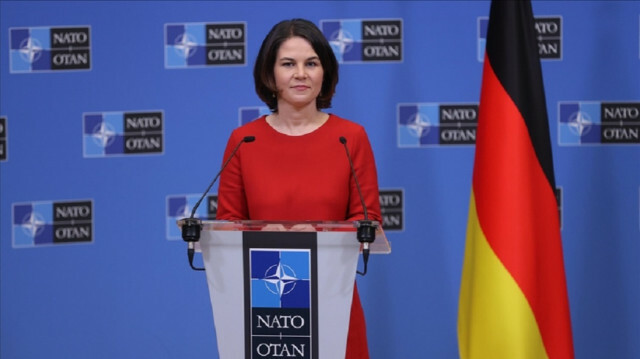
Annalena Baerbock holds talks with NATO chief, top EU diplomat during 1st official visit to Brussels
The tension between NATO and Russia shows the necessity to bring the NATO-Russia Council, a consultation platform, back to life, the new German foreign minister said on Thursday.
Hosted by NATO Secretary-General Jens Stoltenberg in Brussels, Germany's Foreign Minister Annalena Baerbock said: “The tensions show how necessary it would be to revive the NATO-Russia Council, and we are ready to do so,” referring to the consultation mechanism established at the NATO-Russia Summit in 2002.
Baerbock also reaffirmed the new German government’s commitment to supporting Ukraine’s territorial integrity and sovereignty.
Speaking at a joint news conference, Stoltenberg appreciated the new German government’s commitment to NATO.
"NATO needs a strong Germany, both politically and militarily, and your contributions really make a difference for the alliance and it helps to keep peace in Europe,” he said.
He noted that Germany’s contribution to maintaining global security was important because of the “increasingly complex challenges, including Russia's military buildup in and around Ukraine.”
Stoltenberg hailed “Germany's long-standing work in the Normandy format to promote a peaceful solution” to the conflict in Ukraine.
“I welcome (US) President (Joe) Biden's engagement with (Russian) President (Vladimir) Putin earlier this week,” he said, repeating his previous warnings on the “serious political and economic consequences” in case of Russian aggression against Ukraine. Stoltenberg noted that NATO was open for dialogue, including through the NATO-Russia Council, but it was up to Moscow to reply positively to the invitation.
NATO suspended all practical cooperation with the country in 2014 because of Russia’s illegal military intervention and the violation of Ukraine’s territorial integrity and sovereignty.
Baerbock, who was inaugurated on Wednesday as the foreign minister in Chancellor Olaf Scholz’s Cabinet, started her first official trip to Paris, Brussels, and Warsaw on the same day.
On Thursday, she also held talks with Josep Borrell, the EU foreign policy chief.

